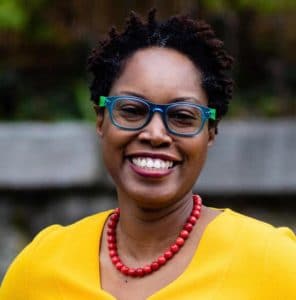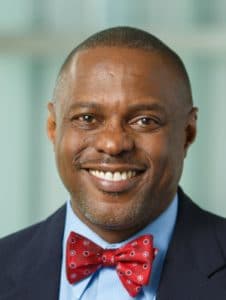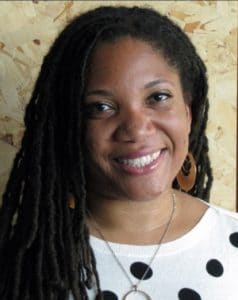Black voices working in a predominately white field

Within the field of psychology, there are very few Black professionals. According to the American Psychological Association, in 2015, only four percent of all psychologists were Black/African-American. Meanwhile, the general population of this country is just over 13 percent Black.
How does that play out for Black psychologists, working in a field that is predominately white? What stressors are they seeing in patients and colleagues? Are there things that should be done to increase Black representation in the field? And, in these turbulent times, is there hope that social justice will prevail?
Charmain Jackman, Ph.D, is a clinical psychologist in Watertown, Massachusetts, and owner of InnoPsych, a company whose mission is to “disrupt racial disparities” in mental health care.
InnoPsych has created a national directory to match clients with therapists of color, offers professional training, and provides consultation and education around emotional wellness. Coming to this country after growing up in a world where her skin color did not make her stand out, Jackman found that she has had to educate herself about the history of racism in the U.S. in order to fulfill a need for therapists like her in Black communities.
“During my graduate work at the University of Southern Mississippi,” she said, “I was one of few Black people in the program. During practicum, I had a Black woman who was just delighted that I was going to be her therapist. That feeling stuck with me. Since then, my work has primarily been in communities of color.”
Increasing the number of Black therapists in the field is a process that must begin long before graduate school, Jackman said.
“We need to have more pipeline programs working with students at the high school and college levels,” she said. “In my work, I had a conversation with Afro-Caribbean students and they are getting messages about mental health not being a real career from their families. We need to do more outreach and get out into the communities.”

Martin Pierre, Ph.D, the president-elect of the Massachusetts Psychological Association (MPA) and a clinical psychologist with a practice in Dorchester, Mass., has also chosen to work primarily with historically marginalized and underserved populations. He has seen an increased need for psychological services, especially among Black males.
“Some of the symptoms the clients are presenting with are symptoms of hyper-vigilance, of anxiety, of depression,” he said. “One client indicated to me that he feels that he has a foreshortened future in regards to his life.”
His conversations with colleagues recently have trended the same way.
“I have male friends calling me and breaking down crying,” he said. “Some of them are mental health providers, some work in corporate America. At first I thought, `oh no, maybe they are crying because of being infected with Covid,’ but after getting in to the conversation, I see that it is not that. It is that they are feeling a great deal of pain and agony as a result of the brutalization of men of color and the repeated viewing of events on television, of watching the events of George Floyd’s death, of the breath of life being sucked out of him. The constant repeated watching of these films it is having a profound impact.”
There is hope for some change, though, he added, referencing the outpouring of support from people of all colors and younger Americans.
“I believe that this is a pivotal moment,” he said. “Historically, in the wake of the Civil Rights Movement and Rodney King’s death and Trayvon Martin, there was some change but it was not broad and systemic. I think this is unique in the sense that we have young people of all races and ethnic groups who are saying that we can no longer stand the brutalizing of Black, brown and yellow people. It is a collective response to the systemic oppression and racism that has permeated the very fiber of this society.”
Psychologists can work to move the needle on racial justice, Pierre added, by staying involved and keeping the conversation going even after the protests have died down.

Valene Whittaker, Ph.D, a counseling psychologist and co-chair for the MPA Committee on Ethnic Minority Affairs, feels some mitigated hope that the protests will help actual change to take place.
“There have been some promising changes and developments,” she said. “Yet, I feel like it remains to be seen how this will continue to be implemented in terms of specific changes within organizations in our society. The reality is that these types of injustices have been happening for centuries.”
In her own work, Whittaker has been focusing on an initiative called Academics for Black Survival and Wellness along with a group of Black counseling psychologists.
“The emphasis,” she said, “is on supporting healing among Black people with respect to mental health and wellness and encouraging ally-ship from other psychologists and people in the world who do not identify as people of color.”
Working alongside colleagues, especially those of color, has created a strong support system for her, she added, and helps her to reach out from a position of greater strength for her clients.
“I definitely am seeing Black folks coming to me personally and professionally and expressing a lot of fear and sadness and anger and other heavy emotions about the on-going and cumulative nature of these events,” she said.
True change in a system that has been created over the past 400 years will take a long time and will require commitment from many people. One concern is that the protests themselves could begin to take center stage, moving the spotlight from the injustices they are meant to address.
“We can’t talk about these protests in a vacuum,” said Jackman. “We need to talk about them in terms of the racial injustice that has gone on for a long time.”
